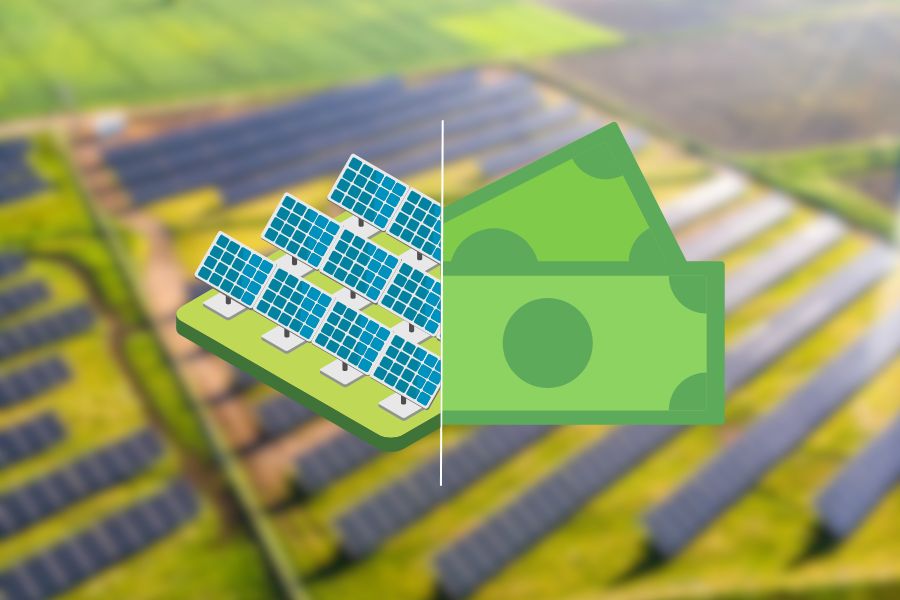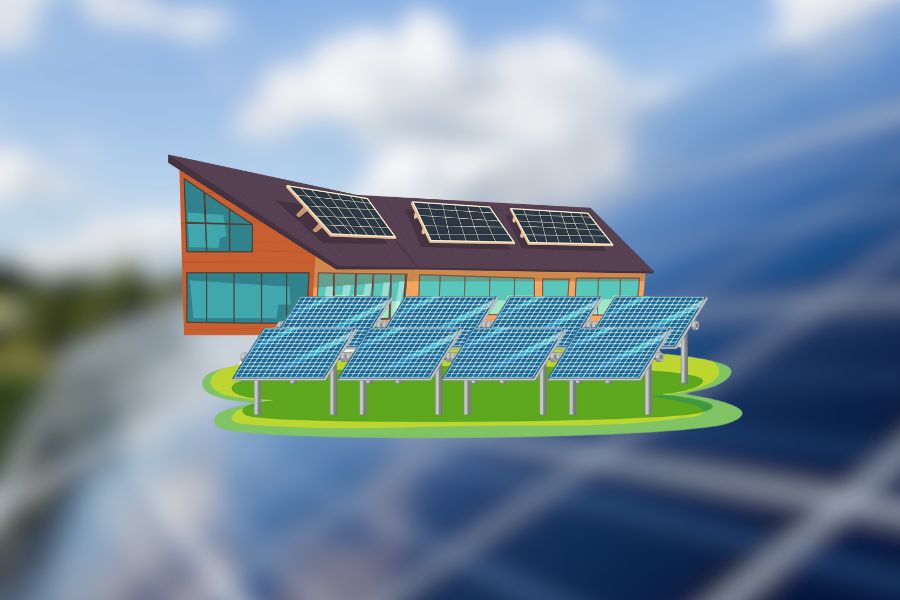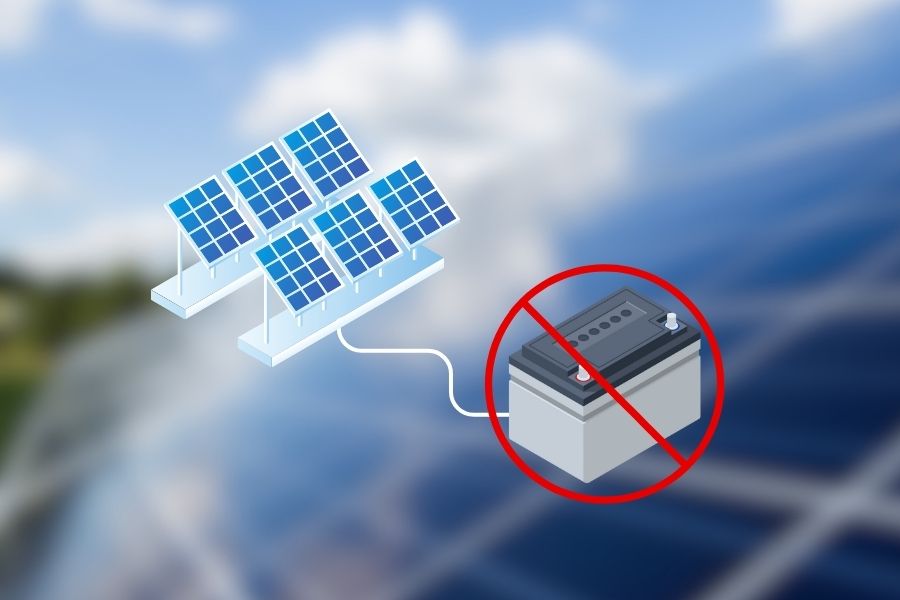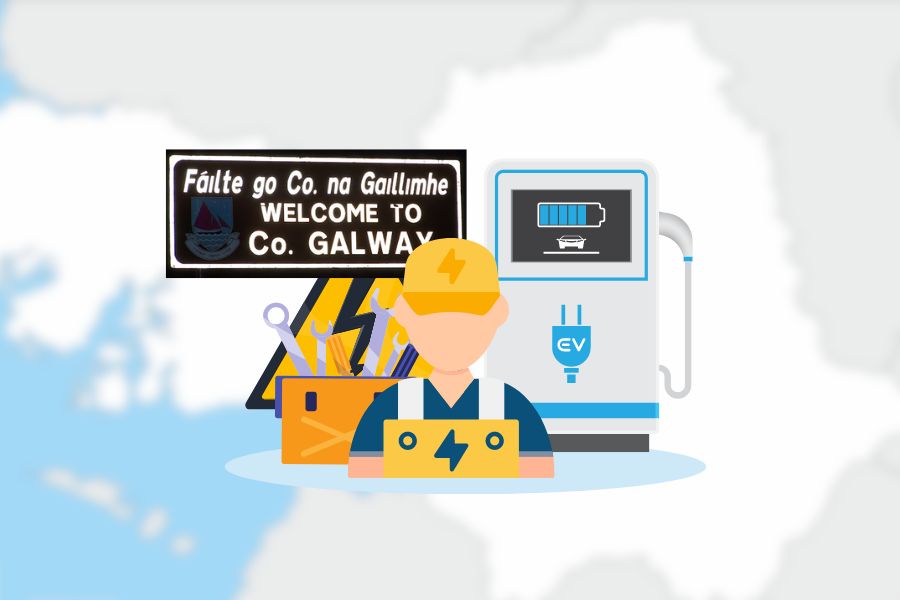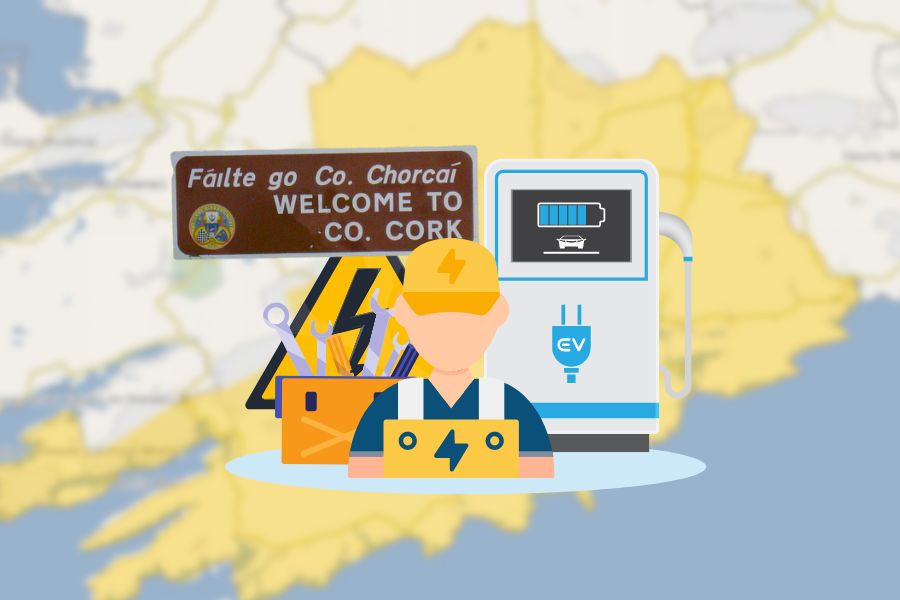The cost of EV charger installation in Ireland varies depending on factors like the charger type, installation complexity, and potential need for an upgraded electrical panel.
The average price range can be anywhere from €600 to €1200. However, with the rising interest in electric vehicles and the associated government incentives, many homeowners find this investment increasingly accessible and worthwhile.
Remember, choosing a reliable installer ensures a safe, efficient setup, optimizing your EV’s performance and contributing to a greener, more sustainable Ireland.
How Much Does Installing a Home Electric Vehicle Charging Station Cost?
The cost of installing a home electric vehicle (EV) charging station in Ireland varies considerably, depending on several factors, including the type of station you opt for and whether you qualify for grants or incentives, including SEAI grants for electric vehicle home chargers. Here’s a more detailed breakdown:
Type of Charging Station
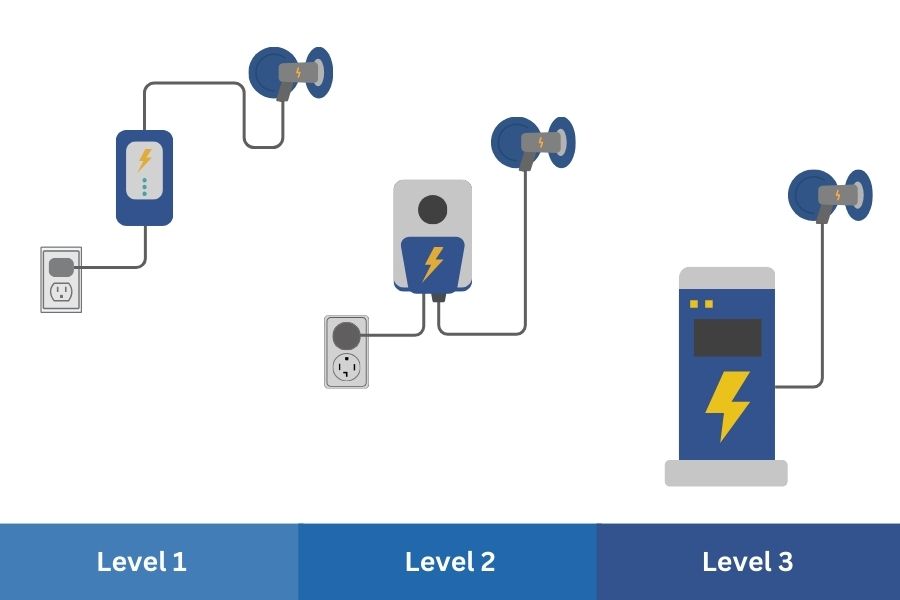
- Level I Charging Stations are the most basic, cost-effective electric vehicle charging options. They use a standard 120-volt AC plug and usually don’t require specialized installation.
- Level II Charging Stations: These charging stations are faster than Level I as they use a 240-volt AC plug but often require professional installation.
- Level III Charging Stations: These are the most advanced and offer the fastest charging speed. However, they are the most expensive option and also require professional installation.
Installation and Equipment Costs
The overall cost of the charging station and its installation will depend on the provider. For most suppliers, the combined cost of a home charging station and its installation typically starts at around €950 to €1,099.
What Power Does a Home Charger Need?
The power requirement of home chargers for battery electric vehicles (BEVs) and hybrid electric vehicles (HEVs) depends on the type of EV charging point you decide to install. Generally, home EV charging points fall into two categories: Level 1 and Level 2 chargers.
Level 1 Chargers
These home chargers for electric vehicles work like an electric shower, taking advantage of your home’s standard 120-volt AC outlets. No specialized installation or dedicated EV charger wiring is needed. Level 1 chargers are the most basic type and offer slower charging rates, typically delivering about 2 to 5 miles of range per hour of charging.
Despite the slower charging rate, they could be adequate if your BEV or HEV is mainly used for short trips and can be left charging for extended periods, such as overnight.
Level 2 Chargers
These dedicated EV chargers require a 240-volt AC circuit, similar to an electric range. They are considered faster EV charging points and can provide about 10 to 60 miles of range per hour of charging.
Level 2 chargers are more appropriate for individuals who cover longer distances daily with their battery electric vehicles or hybrid electric vehicles or those who cannot leave their vehicles charging for extended periods.
To install Level 2 charging points, your home’s electrical system must accommodate the additional load. It might necessitate upgrades to your electrical panel and wiring, particularly in older homes. A certified electrician should assess your home’s electrical system to determine if it can support a Level 2 charger and what upgrades are necessary.
What Electric Vehicle Charger Is Right for Me?

Deciding on the right electric vehicle (EV) charger depends on several specific factors related to your lifestyle, driving habits, type of vehicle, and home’s electrical setup. Below are the basic highlights for you:
Driving Habits
How many miles you typically drive in a day can determine the type of charger you need. If your daily mileage is low and you have ample time to charge your vehicle, a Level 1 charger (which plugs into a standard 120-volt outlet) might suffice. But if you’re driving long distances regularly and need to recharge quickly, a Level 2 charger (which uses a 240-volt outlet and charges much faster) could be a better fit.
Vehicle Type
Different EVs have different battery capacities and, thus, charging needs. Vehicles with larger batteries may take too long to charge efficiently with a Level 1 charger. Most modern EVs and plug-in hybrids can handle Level 2 charging, up to five times faster than Level 1.
Electrical Infrastructure at Home
Level 2 chargers require a dedicated 240-volt circuit, similar to an electric clothes dryer. You might need an electrical panel upgrade to support this, which is an additional cost to consider. You’ll need a qualified electrician to check your setup and install the Level 2 charger.
Budget
Level 1 chargers are the most affordable since they typically come with the vehicle and don’t require unique installation. Level 2 chargers are more expensive and have installation costs but offer greater convenience due to faster charging. Your budget might influence which charger you opt for.
Future Planning
If you plan to upgrade your vehicle in the future or add more EVs to your household, investing in a Level 2 charger now could save you time and money later.
Smart Features
Some modern chargers have smart features such as WiFi connectivity, remote control through mobile apps, and integration with home energy management systems. These features allow for more efficient power use, such as charging during off-peak electricity rate hours.
Once you’ve installed your EV charger, optimizing your charging schedule can save you money. Learn more about the cheapest time to use electricity in Ireland.
How Much Does Running an Electric Car Charging Station at Home Cost?
One can break down the cost of running an electric car charging station at home in Ireland into two primary components: electricity to power the station and any maintenance costs associated with the charging infrastructure.
On average, the annual cost is around €195. However, this cost can vary widely based on factors such as how frequently the car charging happens and how much electricity is in each charging session.
For instance, if an electric vehicle (EV) charges only once a week, the annual running costs would be lower than if it charges multiple times weekly. The electricity rate in your area will also affect this cost.
Moreover, households can reduce the running cost of a home EV charging station by harnessing solar power. If a home has solar panels installed, these can generate electricity that offsets the cost of charging the EV. This renewable energy source can significantly lower the costs associated with EV charging, making it even more cost-effective to run electric vehicles in Ireland.
Remember, this is an estimated cost, and actual expenses can vary based on individual usage and specific home setups. Always consider your circumstances when calculating the running costs of a home EV charging station.
Again, when installing an EV charger at home, consider coupling it with an efficient solar battery storage system for a more sustainable energy solution.
The Price of An Electric Vehicle in Ireland
Like anywhere else, the price of an electric vehicle (EV) in Ireland varies depending on several factors, including the model, the brand, the vehicle’s specifications, and any additional features or packages. Here’s a general idea of what you might expect:
- Economy EVs: These are the most affordable electric vehicles. Cars like the Renault Zoe, Nissan Leaf, or Peugeot e-208 generally fall into this category. Prices typically start at around €20,000 – €30,000.
- Mid-Range EVs: Mid-range electric cars like the Tesla Model 3 or Hyundai Kona Electric are more expensive than economy EVs. They usually offer longer ranges and more features. Prices generally start at around €40,000 – €50,000.
- Luxury EVs: Luxury electric vehicles like the Tesla Model S, Audi e-tron, or Jaguar I-PACE can cost significantly more due to their premium features, brand prestige, and superior performance. Prices for these vehicles often start at around €70,000 and go up from there.
Remember, these are rough estimates, and prices can vary widely. Additionally, the Irish government offers incentives for buying electric vehicles, such as the SEAI grant, which can reduce the purchase price of a new EV by up to €5,000. Tax benefits, like reduced Vehicle Registration Tax (VRT), make owning an electric vehicle more affordable.
What Are The Prices of Home EV Chargers
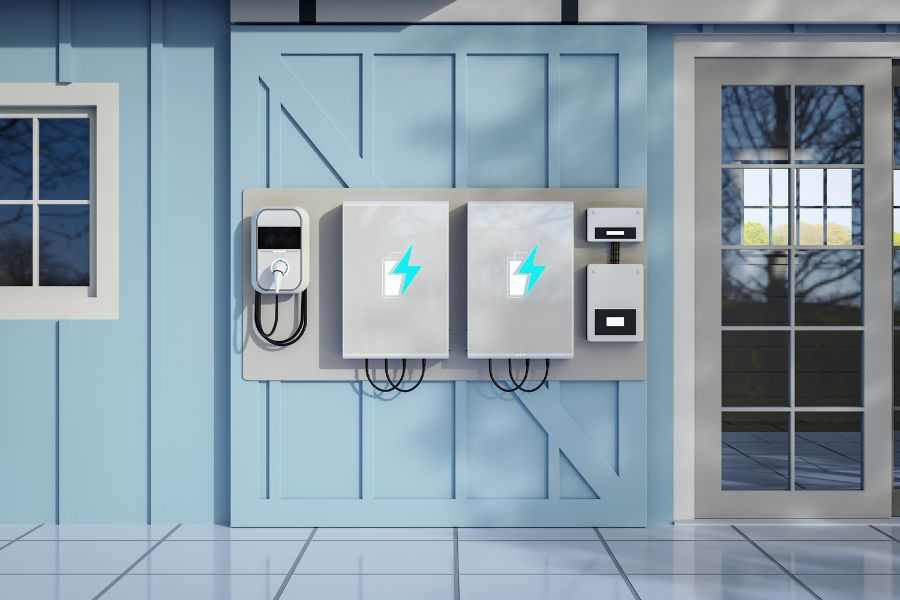
The cost of home Electric Vehicle (EV) chargers can differ significantly based on several factors. These factors include the level of the charger, the brand, and any extra features the charger might offer.
Level 1 Chargers often include the purchase of an EV. These devices plug into a standard 120-volt AC outlet, which means there’s usually no additional cost for the charger. However, some minimal costs may arise if required wiring modifications accommodate this charger level.
The next level up, Level 2 Chargers, are faster than Level 1 Chargers and require a dedicated 240-volt AC circuit. These chargers are more expensive, ranging from €500 to €2,000 or more.
This range in price depends on various factors, including the charger’s brand and any added features. Remember, this cost does not include the installation, which can add several hundred euros. Upgrading your home’s electrical system would also be an extra cost if necessary.
Furthermore, some Level 2 chargers are Smart because of their advanced features. These features can include WiFi connectivity, the ability to control the charger remotely through a mobile app, and the option to schedule charging during off-peak electricity rate periods. Due to these extra features, Smart Chargers are typically at the higher end of the price range for home EV chargers.
Government EV Home Charger Grant
The SEAI offers a grant of up to €600 to help cover purchasing and installing a home charger system. This financial incentive aims to promote the use of electric vehicles by making it more convenient and cost-effective for individuals to charge their EVs at home.
Interestingly, you don’t necessarily have to own an electric vehicle to qualify for this grant. The goal of this stipulation is likely to encourage prospective EV buyers to set up their charging infrastructure in advance. It facilitates a smoother transition to electric vehicle ownership when they’re ready to switch.
As always, grant schemes may have specific terms and conditions, so checking the latest details on the SEAI’s official website or contacting them is advisable. The grant’s availability and value could change based on policy revisions or budget allocations.
Conclusion
Choosing the correct EV charger and ensuring its safe installation is crucial. Always remember to get your EV charger installed by a registered electrical contractor to comply with the Safe Electric Ireland regulations. It ensures the safety of your home and vehicle and validates the manufacturer’s warranty and any potential insurance claims.
If you’re considering an EV charger installation, you might want to explore other efficient energy storage solutions, such as the Tesla Powerwall available in Ireland.
With costs for home charger installations varying from around €500 to €2,000, depending on the type and features of the charger, it’s essential to consider your vehicle type, daily driving habits, and home infrastructure before making a choice. But remember, the initial cost shouldn’t deter you. The SEAI grant of €600 makes this switch more affordable for everyone, even those just thinking about getting an EV.
And who knows? Perhaps installing an EV charging point today could be your first step towards becoming a part of the electric vehicle revolution. After all, every step we take toward sustainable living counts.
Thank you for reading our article on “How Much Is EV Charger Installation Ireland.” Feel free to share your thoughts and experiences with us. Let’s continue the conversation about working together toward a greener and more sustainable future!

